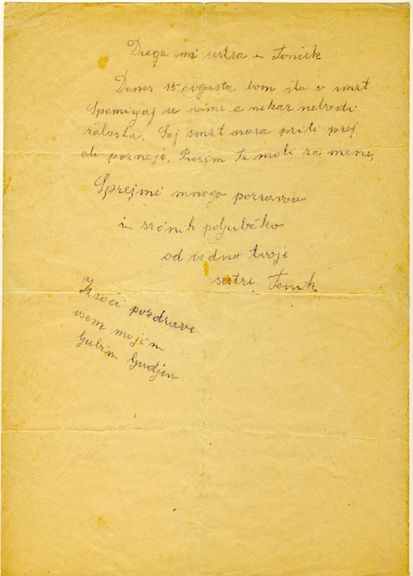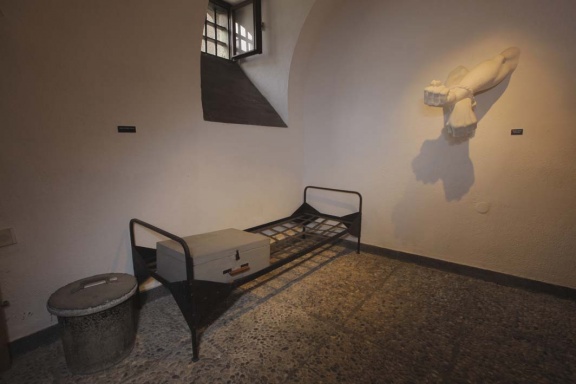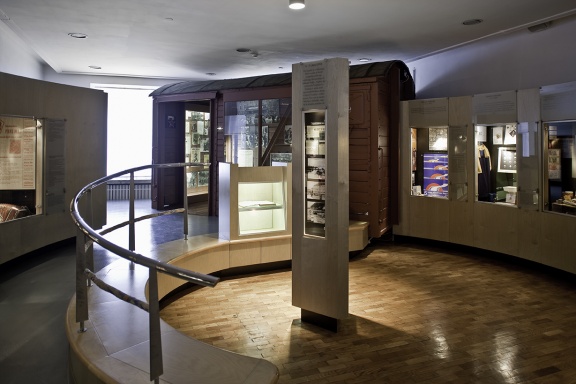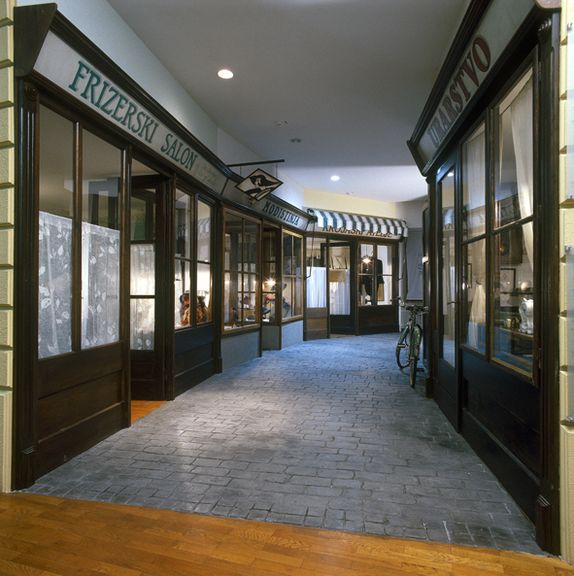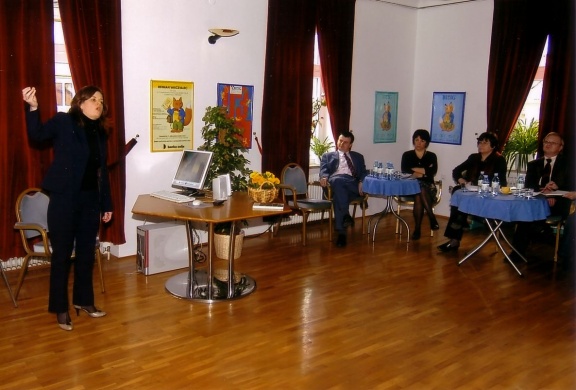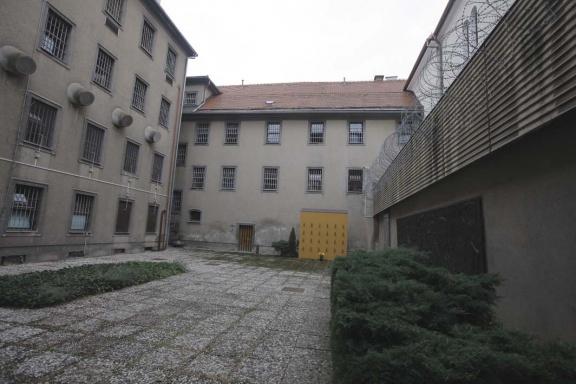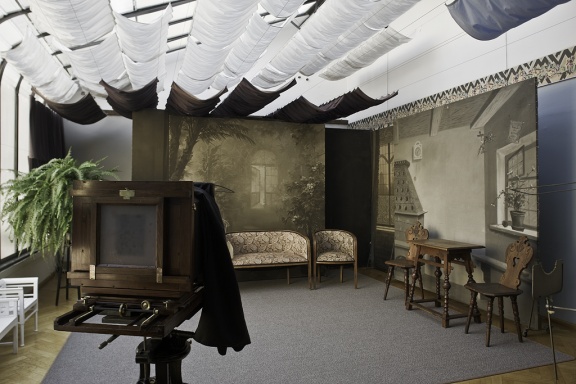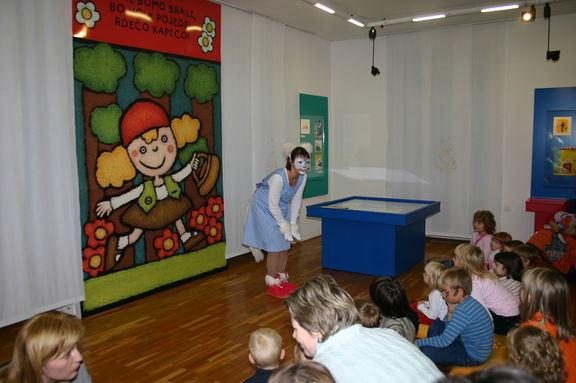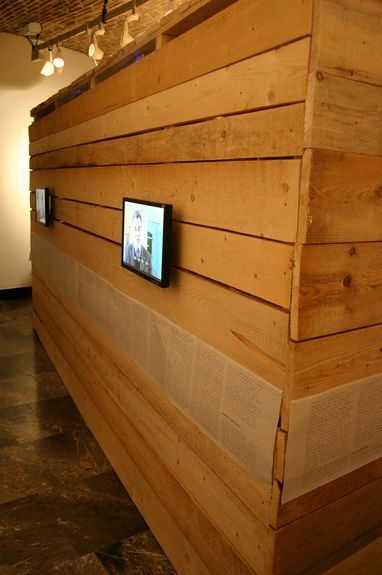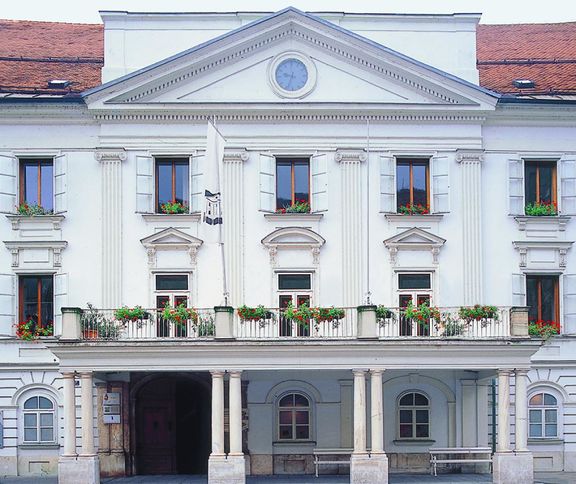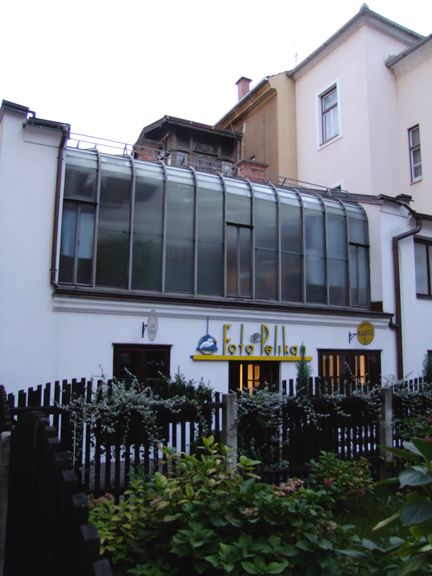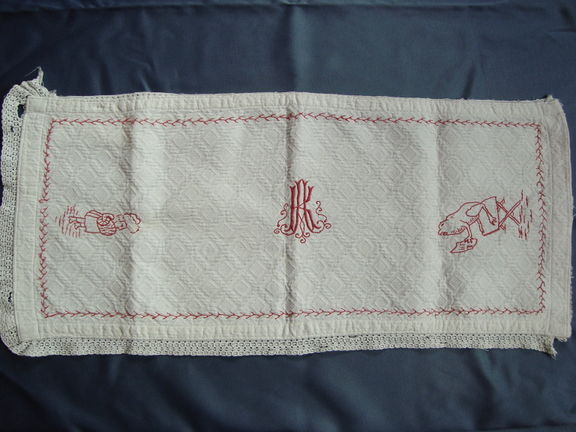Difference between revisions of "Celje Museum of Recent History"
(adding links) |
(fixed) |
||
| Line 1: | Line 1: | ||
{{Article | {{Article | ||
| − | |status = PHOTO COVER | + | |status = TOPROOFREAD NIFERTIK! PHOTO COVER |
| − | |maintainer = | + | |maintainer = Admin |
}} | }} | ||
| Line 35: | Line 35: | ||
{{Teaser| | {{Teaser| | ||
{{Image|Muzej novejše zgodovine Celje.jpg}} | {{Image|Muzej novejše zgodovine Celje.jpg}} | ||
| + | As a public institution the [[Celje Museum of Recent History]] focuses on the cultural heritage of the town of Celje and the Lower Savinjska region from the beginning of the 20th century onward. The permanent exhibition presents the everyday life of the town and its inhabitants in the 20th century while the temporary exhibitions turn towards personal stories and cover pop culture, sports or various historical chapters. The museum's distinguished feature is the ''Herman's Den'', the first Slovenian children's museum. | ||
| + | }} | ||
| − | The | + | ==Background== |
| − | + | The museum was established in [[established::1951]] as a department for the History of the National Liberation War at the Celje Municipal Museum. In 1963 it became an independent cultural institution and moved into the premises of the former town hall of Celje where it is still situated today. | |
==Permanent exhibitions and museum branches== | ==Permanent exhibitions and museum branches== | ||
| − | + | The museum's permanent exhibition, ''Living in Celje'', first opened in 2000, and was renovated and reopened in 2009. It features the ''Diary of Three Generations'' on the first floor, showing how each generation lived in Celje in the course of the 20th century. On the second floor is a reconstruction of ''Celjska Street'' as it looked in the period between the two World Wars. Visitors can walk through various trade shops, the market and a middle-class apartment. | |
Other permanent exhibitions include the museum's Dentistry Collection, donated to the museum by the private collector [[Franc Štolfa]] (1993). ''Herman's Den'' (since 1995) represents the first Slovenian children's museum with a playroom, gallery and theatre. On the invitation of the Hamada Children's Museum of Art in Japan, ''[[Herman's Den]]'' was presented in Japan in 2009. | Other permanent exhibitions include the museum's Dentistry Collection, donated to the museum by the private collector [[Franc Štolfa]] (1993). ''Herman's Den'' (since 1995) represents the first Slovenian children's museum with a playroom, gallery and theatre. On the invitation of the Hamada Children's Museum of Art in Japan, ''[[Herman's Den]]'' was presented in Japan in 2009. | ||
| Line 48: | Line 50: | ||
== Collections == | == Collections == | ||
| − | The [[Celje Museum of Recent History]] has 17 main collections. Starting with the most general historical collection of items from the 18th, 19th and 20th centuries, it has also very specialised collections of such items and topics as: trade, goldsmith trade, postcards, money, EMO kitchenware, arms, decorations and medals, scales, posters, farewell letters, children's toys and crafts. The museum also has a photo and video archive that can be viewed and studied by appointment. | + | The [[Celje Museum of Recent History]] has 17 main collections. Starting with the most general historical collection of items from the 18th, 19th and 20th centuries, it has also very specialised collections of such items and topics as: trade, goldsmith trade, postcards, money, the EMO factory kitchenware, arms, decorations and medals, scales, posters, farewell letters, children's toys and crafts. The museum also has a photo and video archive that can be viewed and studied by appointment. |
Especially worth mentioning is the Fund of [[Alma Karlin]]. It consists of 850 objects, books, drawings, sketches, photographic material and testimonies about an amazing woman, world traveller, writer and anthropologist from Celje, [[Alma Maksimiljana Karlin]] (1889–1950) and her close companion Thea Schreiber Gamelin. In memory of the 120-year-anniversary of Alma's birth, the [[Celje Museum of Recent History]] published the anthology ''Alma's Boundaries and Margins'' (2009). | Especially worth mentioning is the Fund of [[Alma Karlin]]. It consists of 850 objects, books, drawings, sketches, photographic material and testimonies about an amazing woman, world traveller, writer and anthropologist from Celje, [[Alma Maksimiljana Karlin]] (1889–1950) and her close companion Thea Schreiber Gamelin. In memory of the 120-year-anniversary of Alma's birth, the [[Celje Museum of Recent History]] published the anthology ''Alma's Boundaries and Margins'' (2009). | ||
| Line 54: | Line 56: | ||
== Education and international cooperation == | == Education and international cooperation == | ||
| − | The museum put a great effort on its international educational programme called the ''Celje School of Museology'' in collaboration with Museumsakademie Joanneum Graz and Reinwardt Academie Amsterdam. In October 2009 the museum hosted the international museum workshop with the topic ''New Trends in Museology'' with Peter van Mensch and Léontine Meijer van Mensch from Reinwardt Academie Amsterdam. | + | The museum put a great effort on its international educational programme called the ''Celje School of Museology'' in collaboration with Museumsakademie Joanneum Graz and Reinwardt Academie Amsterdam. In October 2009 the museum hosted the international museum workshop with the topic ''New Trends in Museology'' with Peter van Mensch and Léontine Meijer van Mensch from Reinwardt Academie Amsterdam. Its ''Summer School of Museology'' has grown into the [[International Summer School of Museology]]. |
| − | |||
| − | |||
| − | |||
| − | |||
| − | The [[Celje Museum of Recent History]] is a member of the [[International Council of Museums (ICOM), Slovenia|International Council of Museums (ICOM)]] and the Hands on! Association for Children's Museums. With the Museum of Europe in Brussels they collaborated on the exhibition ''The European: His Story''. Celje Museum | + | The [[Celje Museum of Recent History]] is a member of the [[International Council of Museums (ICOM), Slovenia|International Council of Museums (ICOM)]] and the Hands on! Association for Children's Museums. With the Museum of Europe in Brussels they collaborated on the exhibition ''The European: His Story''. Celje Museum was also a partner in the European project ''Museum Sign Language Guide'', an education and museum guidance for people with hearing disabilities. |
The ''JUMUM – Jugend und Musik und Museum'' project supported by the EU Culture Programme 2010–2012 and led by Austrian partner from Bad Ischl popularised the music genre of operetta. The exhibition and some performances took place in Bad Ischl on the occasion of the 50th anniversary of the Lehar Festival and in Eggenfelden, Germany, while in Celje some workshops and a school project The Faces of Operetta took place. | The ''JUMUM – Jugend und Musik und Museum'' project supported by the EU Culture Programme 2010–2012 and led by Austrian partner from Bad Ischl popularised the music genre of operetta. The exhibition and some performances took place in Bad Ischl on the occasion of the 50th anniversary of the Lehar Festival and in Eggenfelden, Germany, while in Celje some workshops and a school project The Faces of Operetta took place. | ||
| Line 67: | Line 65: | ||
* [[Josip Pelikan Photographic Studio, Celje]] | * [[Josip Pelikan Photographic Studio, Celje]] | ||
* [[Stari Pisker Prison]] | * [[Stari Pisker Prison]] | ||
| − | * [[ | + | * [[International Summer School of Museology]] |
* [[Celje Regional Museum]] | * [[Celje Regional Museum]] | ||
* [[Municipality of Celje]] | * [[Municipality of Celje]] | ||
Revision as of 18:07, 16 March 2020
-
to
15 Sep 2023
23 Nov 2023
Exhibition "Alma Maksimilijana Karlin - Authoress", showcasing the writer's life and work. In the scope of Slovenia – Guest of Honour Country at the Frankfurt Book Fair 2023 and made possible by Municipality of Celje, Slovenian Book Agency, Celje Regional Museum, Celje Museum of Recent History and Slovene Ethnographic Museum.
at the Frankfurt Book Fair
-
to
7 Aug 2015
30 Sep 2015
An exhibition of the works of photographer Josip Pelikan from the collection of the Celje Museum of Recent History
-
to
1 Mar 2011
30 Apr 2011
Background
The museum was established in 1951 as a department for the History of the National Liberation War at the Celje Municipal Museum. In 1963 it became an independent cultural institution and moved into the premises of the former town hall of Celje where it is still situated today.
Permanent exhibitions and museum branches
The museum's permanent exhibition, Living in Celje, first opened in 2000, and was renovated and reopened in 2009. It features the Diary of Three Generations on the first floor, showing how each generation lived in Celje in the course of the 20th century. On the second floor is a reconstruction of Celjska Street as it looked in the period between the two World Wars. Visitors can walk through various trade shops, the market and a middle-class apartment.
Other permanent exhibitions include the museum's Dentistry Collection, donated to the museum by the private collector Franc Štolfa (1993). Herman's Den (since 1995) represents the first Slovenian children's museum with a playroom, gallery and theatre. On the invitation of the Hamada Children's Museum of Art in Japan, Herman's Den was presented in Japan in 2009.
The Celje Museum of Recent History administers also two museum branches. The Josip Pelikan Photographic Studio, Celje, with a beautiful glass parlour and all original equipment, from the end of the 19th and early 20th century. The other is the Anti-Nazi memorial site Stari Pisker Prison, known by locals as "The Old Pot". This former Minorite monastery was the site of Nazi violence during World War II, today it is a memorial for the several hundred people who were tortured and executed there.
Collections
The Celje Museum of Recent History has 17 main collections. Starting with the most general historical collection of items from the 18th, 19th and 20th centuries, it has also very specialised collections of such items and topics as: trade, goldsmith trade, postcards, money, the EMO factory kitchenware, arms, decorations and medals, scales, posters, farewell letters, children's toys and crafts. The museum also has a photo and video archive that can be viewed and studied by appointment.
Especially worth mentioning is the Fund of Alma Karlin. It consists of 850 objects, books, drawings, sketches, photographic material and testimonies about an amazing woman, world traveller, writer and anthropologist from Celje, Alma Maksimiljana Karlin (1889–1950) and her close companion Thea Schreiber Gamelin. In memory of the 120-year-anniversary of Alma's birth, the Celje Museum of Recent History published the anthology Alma's Boundaries and Margins (2009).
Education and international cooperation
The museum put a great effort on its international educational programme called the Celje School of Museology in collaboration with Museumsakademie Joanneum Graz and Reinwardt Academie Amsterdam. In October 2009 the museum hosted the international museum workshop with the topic New Trends in Museology with Peter van Mensch and Léontine Meijer van Mensch from Reinwardt Academie Amsterdam. Its Summer School of Museology has grown into the International Summer School of Museology.
The Celje Museum of Recent History is a member of the International Council of Museums (ICOM) and the Hands on! Association for Children's Museums. With the Museum of Europe in Brussels they collaborated on the exhibition The European: His Story. Celje Museum was also a partner in the European project Museum Sign Language Guide, an education and museum guidance for people with hearing disabilities.
The JUMUM – Jugend und Musik und Museum project supported by the EU Culture Programme 2010–2012 and led by Austrian partner from Bad Ischl popularised the music genre of operetta. The exhibition and some performances took place in Bad Ischl on the occasion of the 50th anniversary of the Lehar Festival and in Eggenfelden, Germany, while in Celje some workshops and a school project The Faces of Operetta took place.
See also
- Josip Pelikan Photographic Studio, Celje
- Stari Pisker Prison
- International Summer School of Museology
- Celje Regional Museum
- Municipality of Celje
- International Council of Museums (ICOM), Slovenia
- Museums and memorials related to World War II
External links
- Panoramic view of Living in Celje exhibition
- Alma Karlin website
- The Dentistry Collection on the Institute for the History of Medicine website (in Slovenian)
International cooperation partners and projects
- Museumsakademie Joanneum Graz
- Reinwardt Academie Amsterdam
- JUMUM – Jugend und Musik und Museum project website




